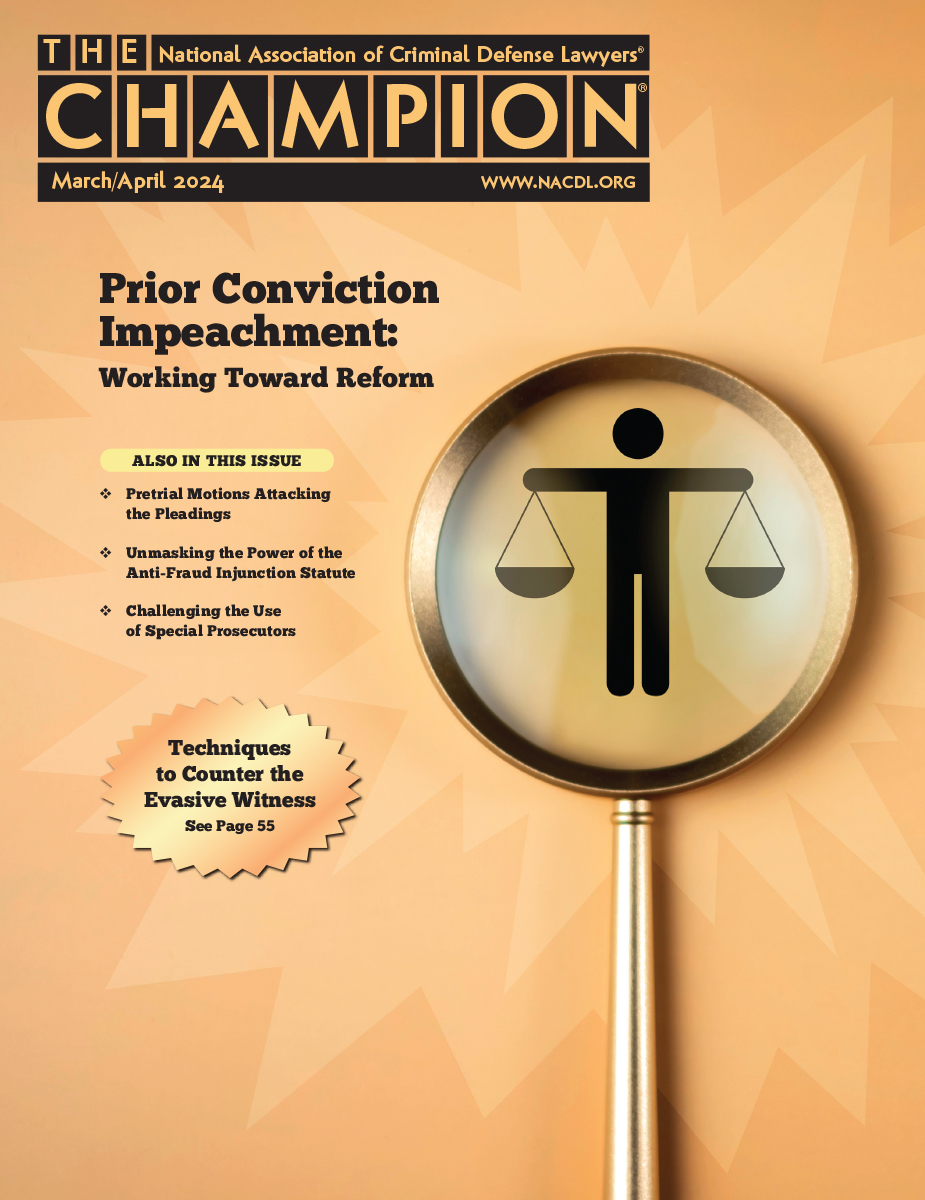March/April 2024

Although introduced for the purpose of impeaching the credibility of defendants and other witnesses, prior convictions do not predict a witness’s truthfulness. How can defense attorneys push back against the practice of prior conviction impeachment right now?
Articles in this Issue
-
A Reckoning with Racism: From Montgomery to Coos Bay
Susan Elizabeth Reese reflects on her visit to The Legacy Museum in Montgomery, Alabama.
-
Affiliate News
What events are NACDL affiliates hosting this month? Find out here.
-
Book Review: Judicial Web by Steve Silva
This month Frank Quintero Jr. reviews Judicial Web by Steve Silva.
-
Book Review: Justice for Baby Roston by Robert A. Anderson Sr.
This month Jaime Roman reviews Justice for Baby Roston by Robert A. Anderson Sr.
-
Book Review: Starkweather by Harry N. MacLean
This month Marshall Snider reviews Starkweather by Harry N. MacLean.
-
Defense Strategy: Post-Dobbs: Litigating an Emotionally and Politically Charged Accusation
While abortion-related prosecutions are not common in 2024, they are likely to be brought more frequently. There is no one-size-fits-all recipe for these cases. Unique situations will present a variety of issues to explore.
-
Forcing the Government’s Hand: Pretrial Pleadings and Framing the Issues
Challenging defects in an Indictment or Information is a great way to compel specificity and fair notice and to help defense counsel understand the prosecution’s theory. Raising the challenge as a pretrial motion helps to focus on issues relevant to defense counsel’s investigation as well as in the presentation of the case in negotiations, trial, and appeal.
-
From the President: The 100-Year Journey from Conviction to Justice
Michael Heiskell interviews a law school professor and former student who were part of a team that was instrumental in convincing the U.S. Army to overturn the 100-year-old convictions of 110 Black soldiers that stemmed from the Camp Logan riots.
-
NACDL News: At the Supreme Court: A Swearing-In Ceremony for NACDL Members
NACDL News for March-April 2024
-
NACDL News: NACDL Mourns the Loss of Justice Sandra Day O’Connor
NACDL News for March-April 2024
-
NACDL News: Statement on Tex. Attorney General’s Response to Court Order Allowing Emergency Abortion
NACDL News for March-April 2024
-
NACDL News: The Defense Community Remembers Aric Cramer’s Dedication to Justice
NACDL News for March-April 2024
-
NACDL News: Tim Evans: A Lasting Legacy
NACDL News for March-April 2024
-
Pozner on Cross: Countering the Evasive Witness: Three Techniques That Demand a Specific Admission
When a witness gives an evasive answer, how can defense counsel put the witness back on track?
-
Prior Conviction Impeachment: Working Toward Reform Within and Beyond the Courtroom
Although the rationale for impeaching with prior convictions is to shed light on an individual’s “propensity for truthfulness,” prior convictions have no connection to truthfulness or untruthfulness. Instead, this practice provides leverage for prosecutors because it deters vital witness testimony. How can defense attorneys push back against the practice of prior conviction impeachment right now?
-
Rule 42 Special Prosecutors: A Separation of Powers Frankenstein
That Is Part Judicial and Part Executive Yet All Vulnerable to Challenge
A dissent from the Supreme Court’s denial of certiorari in United States v. Donziger raised concerns with Fed. R. Crim. Proc. 42, which allows courts to appoint private attorneys as special prosecutors to handle criminal contempt cases. Andrew Boutros and Jay Schleppenbach discuss the constitutional separation of powers arguments that advocates can raise in defending against these prosecutions.
-
Unmasking the Power of the Anti-Fraud Injunction Statute
The government’s successful use of civil injunctions to halt the sale of fraudulent COVID-19 cures has put the Anti-Fraud Injunction Statute in the spotlight. The statute is a unique hybrid of civil and criminal law, and confusion exists as to the proper evidentiary standard. This confusion presents an opportunity for defense lawyers, but they must prepare themselves for the statute’s complexities and landmines.
